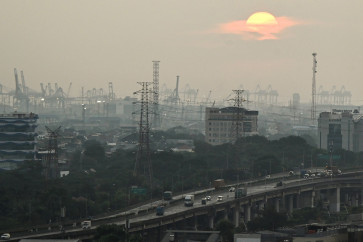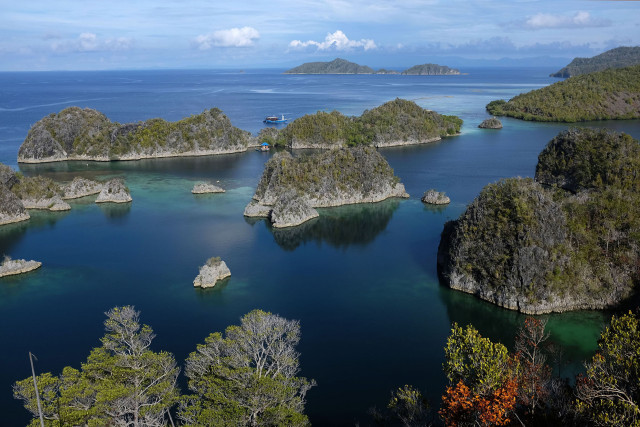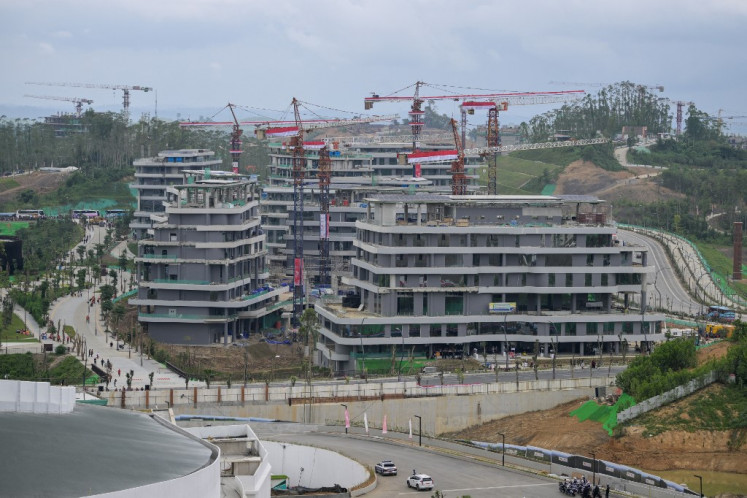UGM-made extensometer applied in China, Myanmar
A landslide early warning device, known as an extensometer, created by lecturers from Gadjah Mada University (UGM) school of engineering, has reportedly been utilized in Myanmar and China
Change text size
Gift Premium Articles
to Anyone

A
landslide early warning device, known as an extensometer, created by lecturers from Gadjah Mada University (UGM) school of engineering, has reportedly been utilized in Myanmar and China. But unfortunately it has not yet been widely used at home despite the device's affordable price and Indonesia's vulnerability to landslides.
A lecturer of the school, Teuku Faisal Fathani, said the Chinese government first saw the device in 2007. A year later it bought 100,000 to be installed in regions prone to landslides.
'In Myanmar, the buyer was a multinational gold mining company, the United Mercury Group,' Dwikorita Karnawati, another lecturer of the school, said recently in Yogyakarta.
According to Faisal, the company bought six devices worth Rp 120 million (US$12,000) in total. The price, he said, ranged from Rp 10 million to Rp 40 million. The analog version is priced at Rp 10 million, the digital version is Rp 20 million and the version with a mechanism of sending data through telemetry is Rp 40 million.
Dwikorita said she developed the device together with Faisal and Wahyu Wilopo, also from the same school, since 2005. She said UGM initially had a project with Kyoto University, Japan, and received an extensometer package from Japan.
'The Japan-made device is too expensive to be applied in Indonesia. If something is wrong with it, it needs to be returned to Japan for maintenance,' Dwikorita said.
According to Faisal, one unit of the analog extensometer, made in Japan, is worth around $4,000. He said the team had developed a third generation of the device that was specialized for geothermal companies.
'There's already around 30 variants of both analog and digital,' said Faisal.
Separately, Wahyu said the installation of the device needed to be very carefully carried out. A team at the school had to see the location first before installing the device.
The main device is installed on stable ground. A metal wire is connected from the main device and is placed in the ground deemed unstable. When the unstable ground moves, it will move the wire, which then moves the scale on the extensometer to indicate the strength of the move.
If the ground moves to the critical point that can possibly cause landslides, the siren sounds. It is then that people are warned to evacuate because of a possible landslide threat.
The extensometer also comes with a rain measuring device because landslides usually also happen in the rainy season.
The device, according to Dwikorita, once saved the lives of 37 families of Kalitelaga village in Banjarnegara regency, Central Java, in 2007, as they could be evacuated before a landslide occurred. 'The siren rang four hours before the landslide hit the area,' she said.
In Indonesia, she said, the device had been used in a number of regions in Sumatra, Java, Sulawesi and Kalimantan. A number of mining companies, including PT Arutmin Indonesia and PT INCO Soroako had also used the device.
Dwikorita said that Indonesia, 50 percent of which was prone to landslides, had not yet fully installed the device in its disaster preparedness measures. 'Maybe the government has other priorities,' she added.
Meanwhile, the National Disaster Mitigation Agency's (BNPB) spokesperson Sutopo Purwo Nugroho said that during January to May 2013 there were 138 landslides, killing 115 people.
'Landslides are intensifying in Indonesia,' he said, blaming the condition on the damage in watershed areas, high rain intensity and limited disaster mitigation.









